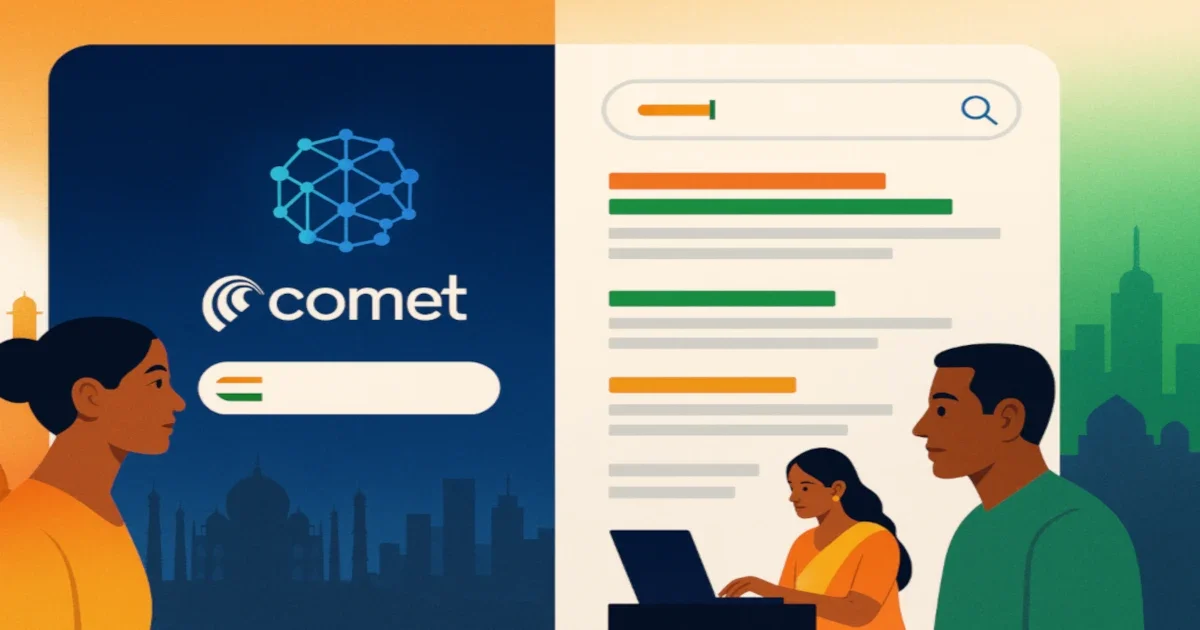Perplexity’s $34.5B Chrome Gambit: Bold move or beautifully timed bluff?
If you felt a small tremor across tech Twitter this week, that wasn’t an earthquake—it was Perplexity’s Indian-origin CEO, Aravind Srinivas, lobbing a $34.5 billion, all-cash offer at Google for its Chrome browser. Yes, that Chrome—the default front door to the internet for billions. The bid is audacious, borderline improbable, and exactly the kind of shot that forces everyone to re-ask a simple question: who should own the gateway to the web in an AI-first world?
What’s actually on the table
Perplexity’s proposal isn’t a vague “let’s chat” email. It’s a formal, unsolicited bid with some strategic sweeteners: keep Chromium open-source, invest $3 billion over the next two years, retain most Chrome staff, and (for now) keep Google as the default search engine. That last bit is clever politics—lower regulatory blood pressure without giving away the endgame. Chrome, meanwhile, sits on a mountain of distribution: more than three billion users.
Two important footnotes: Alphabet hasn’t put Chrome up for sale, and analysts don’t expect Google to entertain the offer. Still, Perplexity says it has outside financing lined up, and the mere existence of a price tag puts new pressure on long-running antitrust proceedings.
The legal weather that makes this possible
You don’t throw a dart like this without reading the room. In August 2024, a U.S. federal court found Google illegally maintained a search monopoly. Remedies—potentially including a forced Chrome divestiture—are now on the judge’s desk. Even if a sale order lands, appeals could drag for years, but the fact that “sell Chrome” is on the menu changes the chessboard.
That’s why Perplexity’s bid matters: it signals to the court (and regulators globally) that buyers exist, terms can be reasonable, and breaking up the browser from the search ad machine might actually increase competition rather than torch it. It’s also why some rivals and investors are sniffing around as hypothetical bidders.
Why Perplexity cares so much about a browser
AI search lives and dies on distribution. Perplexity’s own AI-native browser, Comet, promises agentic browsing—summaries that pop up where you need them, automated form-filling, even task flows that click and type for you. The vision is seductive, but adoption is the boss fight. Chrome short-circuits that problem: buy the front door, don’t beg people to switch doors.
And the arms race is getting noisy. OpenAI is cooking its own browser. Google is stuffing AI-generated “Overviews” into Search and Chrome. Whoever controls the browser controls the canvas where AI paints.
Could Google actually sell Chrome?
Short answer: unlikely—voluntarily. Chrome isn’t just a browser; it’s the distribution spine for Google Search, Ads, and a growing set of AI features. Even if ordered to divest, expect a long legal march through appeals. As one antitrust scholar put it, we could be in for years of litigation before any divestiture sticks. Translation: don’t hold your breath for a handover this quarter.
Also, price will be a food fight. DuckDuckGo’s CEO has suggested Chrome might be worth at least $50B in a compelled sale, which makes Perplexity’s $34.5B look like an opening offer, not a final answer.
What this means for India (yes, it matters here)
India isn’t just another market; it’s an Android nation. Our antitrust regulator (CCI) has already slapped Google with a ₹1,337 crore penalty and forced changes—like letting OEMs license Google apps individually and giving users more control over default search—in response to competition concerns. If Chrome ever gets pried loose globally, you can bet India will push hard for real, user-friendly choice screens, leaner pre-installs, and more oxygen for local search and content apps.
On the advertising side, the CCI has also expanded probes into Google’s ad-tech stack. A Chrome spin-out could ripple through that ecosystem too—potentially opening doors for Indian publishers and ad-tech startups if default pathways become less… default.
The upside if (some version of) this happens
- Real competition at the gateway. Splitting the browser from the search behemoth could weaken “default lock-in,” giving users meaningful choice and making search results compete on quality again.
- Faster AI in the browser. Comet-style agentic features—smart summaries, shopping flows, travel planning that auto-books and calendar-syncs—move from early adopters to the mainstream.
- Healthier web economics. If defaults aren’t bought, smaller search engines and Indian vertical players (jobs, travel, local commerce) get a fairer shot at traffic. That can kickstart better content and services for desi users. (Inference based on remedy goals and market structure.)
The risks we shouldn’t ignore
- Security and stability. Moving the world’s most used browser to a startup—however well-funded—raises operational and security questions. Chrome’s scale means one bad update is everyone’s bad day. (This is why skeptics expect regulators to move cautiously.)
- Funding and governance. Perplexity’s “outside financing” is opaque. A highly leveraged browser owner could be tempted into aggressive data monetisation or pay-to-play defaults—precisely what regulators are trying to unwind.
- Fragmentation risk. Even with Chromium staying open-source, a rushed transition could balkanise extensions, policies, and enterprise deployments.
So… bold move or bluff?
Both. The offer is a moonshot with a message: the browser is the new battleground for AI, and Chrome’s ownership shouldn’t be sacred if we want a fairer web. Even if Google shrugs and the court punts, Perplexity has forced a conversation—among regulators, rivals, and, crucially, users—that was overdue. For India, that conversation dovetails neatly with our own antitrust playbook: more choice, less bundling, better incentives for local innovation.
Whether this ends in a sale, a court-mandated compromise, or just a stronger Comet, one thing is clear: the era of sleepwalking through defaults is ending. And that’s good news for anyone who wants the internet to work a little harder for them.





